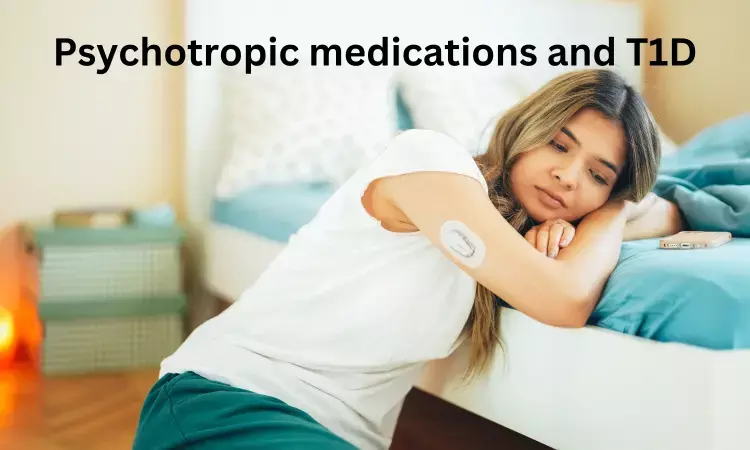- Home
- Medical news & Guidelines
- Anesthesiology
- Cardiology and CTVS
- Critical Care
- Dentistry
- Dermatology
- Diabetes and Endocrinology
- ENT
- Gastroenterology
- Medicine
- Nephrology
- Neurology
- Obstretics-Gynaecology
- Oncology
- Ophthalmology
- Orthopaedics
- Pediatrics-Neonatology
- Psychiatry
- Pulmonology
- Radiology
- Surgery
- Urology
- Laboratory Medicine
- Diet
- Nursing
- Paramedical
- Physiotherapy
- Health news
- Fact Check
- Bone Health Fact Check
- Brain Health Fact Check
- Cancer Related Fact Check
- Child Care Fact Check
- Dental and oral health fact check
- Diabetes and metabolic health fact check
- Diet and Nutrition Fact Check
- Eye and ENT Care Fact Check
- Fitness fact check
- Gut health fact check
- Heart health fact check
- Kidney health fact check
- Medical education fact check
- Men's health fact check
- Respiratory fact check
- Skin and hair care fact check
- Vaccine and Immunization fact check
- Women's health fact check
- AYUSH
- State News
- Andaman and Nicobar Islands
- Andhra Pradesh
- Arunachal Pradesh
- Assam
- Bihar
- Chandigarh
- Chattisgarh
- Dadra and Nagar Haveli
- Daman and Diu
- Delhi
- Goa
- Gujarat
- Haryana
- Himachal Pradesh
- Jammu & Kashmir
- Jharkhand
- Karnataka
- Kerala
- Ladakh
- Lakshadweep
- Madhya Pradesh
- Maharashtra
- Manipur
- Meghalaya
- Mizoram
- Nagaland
- Odisha
- Puducherry
- Punjab
- Rajasthan
- Sikkim
- Tamil Nadu
- Telangana
- Tripura
- Uttar Pradesh
- Uttrakhand
- West Bengal
- Medical Education
- Industry
Noteworthy rise of Psychotropic Medication Use among children With Type 1 Diabetes: JAMA

Type 1 diabetes (T1D) is one of the most common chronic condition onsets during childhood. Type 1 Diabetes Mellitus and psychosocial illness influence each other in multiple ways. The extent of psychosocial disorders in children with T1DM remains unknown.
A new study published in JAMA Network Open discussed the benefits and risks of psychotropic medications for children and adolescents with T1D and highlight the need for clinical attentiveness and recommendations. Study suggests psychotropic prescriptions, such as hypnotics, ADHD medications and antidepressants, have increased exponentially in children and adolescents with type 1 diabetes.
Researchers also note that psychiatric care was the primary prescription source among those with T1D receiving a prescription for psychotropic medication, and up to 50.1% of treatments lasted more than 12 months.
The population based cohort study used data from multiple Swedish registers. The main study cohort included children and adolescents residing in Sweden from 2006 to 2019 and was followed up until the earliest of December 31, 2019, 18th birthday, emigration, or death. The primary outcomes were trends and patterns of psychotropic medication dispensation (including antipsychotics, antidepressants, anxiolytics, hypnotics, mood stabilizers, and medications for attention-deficit/hyperactivity disorder [ADHD]), psychotropic medication initiation, and history of neurodevelopmental and psychiatric diagnosis. Cumulative incidence curves and Cox proportional hazard models were used to estimate the aggregated incidence and hazard ratios of medication initiation after diabetes onset.
The key findings of the study are
• Total of 37,23,745 children and adolescents (1 896 199 boys [50.9%]), out of which 13 200 (0.4%; 7242 boys [54.9%]) had T1D.
• Between 2006 and 2019, psychotropic medication dispensation increased from 0.85% to 3.84% among children and from 2.72% to 13.54% among adolescents with T1D, consistently higher than their peers without T1D.
• The most commonly dispensed medications included hypnotics, ADHD medications, anxiolytics, and selective serotonin reuptake inhibitors, and all exhibited increasing trends.
• For those with T1D, psychiatric care was the primary prescription source, and up to 50.1% of treatments lasted more than 12 months.
• In addition, children and adolescents with T1D showed higher cumulative incidence and hazard ratios of medication initiation after diabetes onset than their same-age and same-sex counterparts.
Researchers concluded that “This cohort study found an increasing trend in psychotropic medication dispensation among children and adolescents with T1D from 2006 to 2019, persistently higher than those without T1D. These findings call for further in-depth investigations into the benefits and risks of psychotropic medications within this population and highlight the importance of integrating pediatric diabetes care and mental health care for early detection of psychological needs and careful monitoring of medication use.”
Reference: Liu S, Lagerberg T, Ludvigsson JF, et al. Psychotropic Medication Use in Children and Adolescents With Type 1 Diabetes. JAMA Netw Open. 2023;6(10):e2336621. doi:10.1001/jamanetworkopen.2023.36621
MSc. Neuroscience
Niveditha Subramani a MSc. Neuroscience (Faculty of Medicine) graduate from University of Madras, Chennai. Ambitious in Neuro research having worked in motor diseases and neuron apoptosis is interested in more of new upcoming research and their advancement in field of medicine. She has an engrossed skill towards writing and her roles at Medical dialogue include Sr. Content writer. Her news covers new discoveries and updates in field of medicine. She can be reached at editorial@medicaldialogues.in
Dr Kamal Kant Kohli-MBBS, DTCD- a chest specialist with more than 30 years of practice and a flair for writing clinical articles, Dr Kamal Kant Kohli joined Medical Dialogues as a Chief Editor of Medical News. Besides writing articles, as an editor, he proofreads and verifies all the medical content published on Medical Dialogues including those coming from journals, studies,medical conferences,guidelines etc. Email: drkohli@medicaldialogues.in. Contact no. 011-43720751


